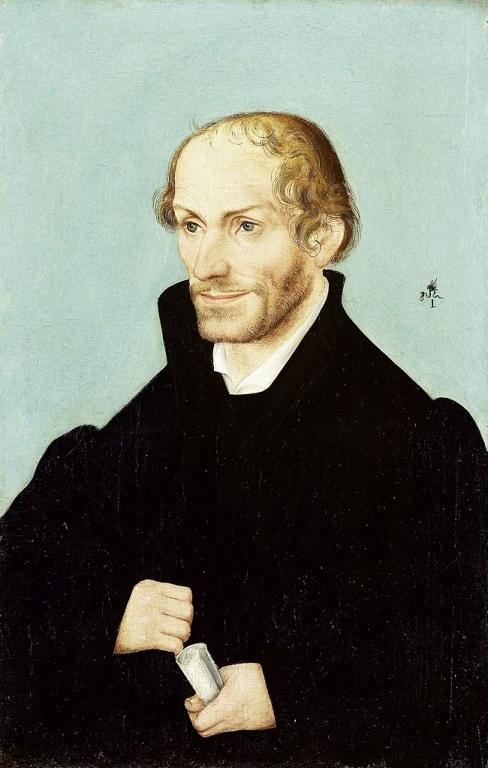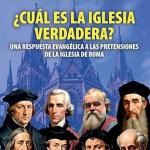
Philip Melanchthon (1497-1560) was the founder of Protestantism: Martin Luther’s best friend, co-reformer, and successor as the leader of Lutheranism. Encyclopaedia Britannica (“Philipp Melanchthon“) states that “Melanchthon . . . in 1521 published the Loci communes rerum theologicarum (‘Theological Commonplaces’), the first systematic treatment of Reformation thought.” It’s considered the initiatory work in the Lutheran scholastic tradition. Modified editions appeared in 1535, 1543 and 1559.
Martin Luther wrote, “No better book has been written after the Holy Scriptures than Philip’s. He expresses himself more concisely than I do when he argues and instructs. I’m garrulous and more rhetorical” (Table-Talk, 1543; in Luther’s Works, Vol. 54, 439-440). Many think that this volume was the reason why Luther never wrote his own work of systematic theology. Melanchthon at length departed from Luther in some ways; most notably, in his denial of the Real Presence in the Holy Eucharist, by the time of the 1543 edition, and on the question of free will.
Luther, who had some violent disagreements with him, never criticized him publicly and never really broke with him. In fact, the verdict of history is that Luther was kinder to Melanchthon than Melanchthon was to Luther. . . . Most Lutherans in America up to the present time have been critical of him, including Schmauck, Neve, Bente, Pelikan, and many others, although that attitude is changing somewhat. (p. 7)*Melanchthon was a prodigy. He entered Heidelberg University at twelve and received his bachelor’s degree at 14. He moved on to Tubingen, where he earned the master’s degree at 17, . . . He never received the doctorate and was never ordained into the ministry. He never preached from the pulpit, although he had much to do with the development of the study of oratory and homiletics. He received an appointment to teach at the newly established University of Wittenberg in 1518. . . . He remained at Wittenberg the rest of his life . . . differences [with Luther] appear as early as 1530, . . . and become more evident as the years roll on. (p. 8)*
*****
Luke 16:19-31 “There was a rich man, who was clothed in purple and fine linen and who feasted sumptuously every day. [20] And at his gate lay a poor man named Laz’arus, full of sores, [21] who desired to be fed with what fell from the rich man’s table; moreover the dogs came and licked his sores. [22] The poor man died and was carried by the angels to Abraham’s bosom. The rich man also died and was buried; [23] and in Hades, being in torment, he lifted up his eyes, and saw Abraham far off and Laz’arus in his bosom. [24] And he called out, `Father Abraham, have mercy upon me, and send Laz’arus to dip the end of his finger in water and cool my tongue; for I am in anguish in this flame.’ [25] But Abraham said, `Son, remember that you in your lifetime received your good things, and Laz’arus in like manner evil things; but now he is comforted here, and you are in anguish. [26] And besides all this, between us and you a great chasm has been fixed, in order that those who would pass from here to you may not be able, and none may cross from there to us.’ [27] And he said, `Then I beg you, father, to send him to my father’s house, [28] for I have five brothers, so that he may warn them, lest they also come into this place of torment.’ [29] But Abraham said, `They have Moses and the prophets; let them hear them.’ [30] And he said, `No, father Abraham; but if some one goes to them from the dead, they will repent.’ [31] He said to him, `If they do not hear Moses and the prophets, neither will they be convinced if some one should rise from the dead.'”
1) Prayer petitions can be made to someone other than God: to dead saints; in this case, a famous figure and the father of faith and monotheism, Abraham. Three petitions are made (16:24, 27-28, 30). In Luke 16:27 in the King James Bible, it even renders what the rich man says as, “I pray thee.”*2) The rich man assumes that Abraham has it in his power to answer his petitions. Abraham doesn’t deny that he can answer; nor does this contradict the idea that Abraham would go to God to fulfill the request (per Rev 5:8), and if God so wills, deliver the reply to the rich man. From the rich man’s perspective, Abraham can grant to him what he desires.*3) The usual Protestant counter-reply to this is to say that Abraham refused the requests. But that no more proves their illegitimacy than God’s refusal to answer all of our prayers “proves” that we shouldn’t pray to Him. If prayer to him were indeed totally improper, Jesus could have never told the story in the first place. It would be a demonic lie, from Jesus’ lips! And if Protestants are right on this point, Abraham would have had to say that the rich man was asking amiss, and he would have rebuked him and told him to “pray to God only! You can’t pray to me!” But he didn’t. Therefore, it is proper.*4) The second most common Protestant retort is to say that both men are dead, so it is an irrelevant example. This fails, because if in fact we ought to never pray to anyone but God, it remains a sin even after we are dead (like the rich man was). What’s wrong is wrong. If such a prayer is totally impermissible, period, then the rich man can’t make it. Whether he is dead or not is irrelevant. He’s still alive as a soul.*5) Melanchthon is dead wrong. It’s Jesus Christ, Who is God, Who taught us this sort of prayer, by providing the story that included it without condemnation and no hint of wrongdoing (in praying to Abraham) whatsoever. Jesus can’t contradict Himself. He can’t “obscure” Himself. And He certainly can’t teach rank heresy in any illustrative story or parable that He tells, or any of His sayings or sermons whatsoever. Yet here we are: Jesus is teaching things that Protestants tell us are damnable lies and idolatrous, blasphemous, occultic practices. One must choose! I choose Jesus over unbiblical man-made traditions, any day, any time.
*
***
*
Practical Matters: I run the most comprehensive “one-stop” Catholic apologetics site: rated #1 for Christian sites by leading AI tool, ChatGPT — endorsed by popular Protestant blogger Adrian Warnock. Perhaps some of my 4,800+ free online articles or fifty-five books have helped you (by God’s grace) to decide to become Catholic or to return to the Church, or better understand some doctrines and why we believe them.
Or you may believe my work is worthy to support for the purpose of apologetics and evangelism in general. If so, please seriously consider a much-needed financial contribution. I’m always in need of more funds: especially monthly support. “The laborer is worthy of his wages” (1 Tim 5:18, NKJV). 1 December 2021 was my 20th anniversary as a full-time Catholic apologist, and February 2022 marked the 25th anniversary of my blog.
PayPal donations are the easiest: just send to my email address: [email protected]. Here’s also a second page to get to PayPal. You’ll see the term “Catholic Used Book Service”, which is my old side-business. To learn about the different methods of contributing (including Zelle), see my page: About Catholic Apologist Dave Armstrong / Donation Information. Thanks a million from the bottom of my heart!
*













